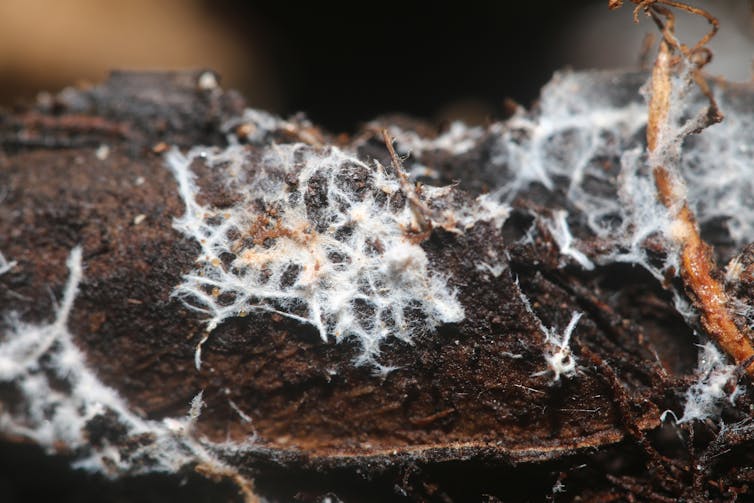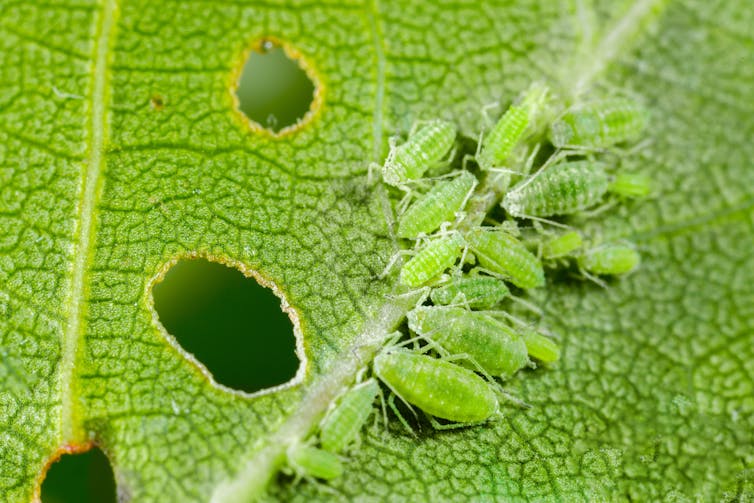
Trees in a forest might look solitary but they are connected underground by a complex network of thread-like strands of fungi, some of which may only be visible to us as mushrooms on the surface. Through these connections in the soil, trees are widely believed to share food, water and even information, such as warnings of enemy attack. The concept of an interconnected forest has evoked comparisons with the internet, hence the moniker “the wood-wide web”.
The idea that trees share resources and potentially communicate with each other through fungal interlocutors seemed fantastical and was a startling revelation upon its first discovery in the mid-1990s. Nearly three decades on, researchers have examined the evidence and found that while soil fungi are important, some of the popular claims made about the wood-wide web lack proof.
Nearly all plants form partnerships with fungi living in their roots, together known as mycorrhizas. Some of these fungi sprout mushrooms at the soil surface, but a mushroom is really just the tiny bit we see. Most mycorrhizal fungi live entirely underground, existing only as near-invisible thread-like strands called hyphae that grow out from the roots of plants to explore the soil.
By allowing these fungi to live in their roots, plants receive essential nutrients from the soil. The fungi meanwhile receive the fruits of photosynthesis (sugars and fats) from their plant hosts. These fungal threads form vast webs in the soil known as common mycorrhizal networks which can connect plants together.

A disconnect in the wood-wide web
In 1997, scientists demonstrated that carbon, a primary energy source for all life, could be transmitted between trees across a mycorrhizal network. This finding prompted speculation that mycorrhizal fungi were helping trees communicate and share resources. Cooperation, rather than competition, was more significant in nature it seemed – a notion that challenged prevailing evolutionary dogma. The authors of this new study have some doubts.
Despite the widespread belief that plants share food using mycorrhizal networks, the evidence remains inconclusive. In lab and field experiments, the amount of carbon and other resources transferred between plants is typically small and stays mostly in the mycorrhizal roots. This means that while fungi are receiving carbon from one plant, much of it probably stays with the fungus rather than being transferred to another plant. This raises the question of how important these transfers might actually be to trees in a forest.
And is it the plants or the fungi who are in charge of transferring these sugars, fats and nutrients? What fungi are doing and why they do it is rarely considered in these studies. It is just as likely that the transfer of food between plants is driven by fungal appetite as it is fungal altruism. These considerations underline the need for more research to understand the role of mycorrhizal networks in transmitting resources and information through communities of plants.
The way experiments are reported also affects scientific and public perceptions. Positive citation bias, where positive results are cited more often in the scientific literature than neutral or negative findings, means studies showing evidence for resource transfer between trees via fungal networks have tended to be more readily cited than those that don’t, perpetuating misconceptions among the public and scientists.
The authors of the new paper showed how exaggerated claims of experimental results can become subject to even more misinterpretation over time. This leads to scientific studies being cited for documenting effects that were not claimed by the original authors. For example, many papers attribute their observed effects to potential common mycorrhizal networks, but are then quoted as offering hard proof of their existence and function. And while the use of anthropomorphic language, such as “talk”, “share”, and “trade”, can help to simplify and communicate findings, it can also distort the complexity and prevent a full understanding of a natural phenomenon.
Why the concept is still useful
Despite these considerations, there is some supporting evidence for the communication and sharing of resources between plants via mycorrhizal fungi.
Fungi have been shown to act as conduits for communicating defensive signals, at least between some types of plants. This has been shown to help bean plants prepare for future attacks by aphids in experiments where fungal connections between plants were either severed or left intact. Although, what these signals are and how they are transmitted remains unknown.

Other experiments have shown carbon and water moving between Japanese red pine and Scots pine tree seedlings in controlled laboratory conditions, although these may not reflect the conditions found in nature. A field experiment showed a dye moving between ponderosa pine seedlings via mycorrhizal fungi. However, there is still no definitive proof that a common mycorrhizal network was involved. There are equally plausible alternative explanations, including other soil microbes, diffusion of the dye through water in the soil and direct contact between plant roots.
Considering the evidence, it is clear that the function of common mycorrhizal networks between trees in forests has been overstated. But the wood-wide web concept can still help scientists highlight and communicate the significance of mycorrhizal fungi in natural and managed ecosystems.
The world beneath our feet is easy to overlook and, as a result, soil ecology has often been neglected in scientific research, public policy and resource management, despite its importance to the health and stability of ecosystems. The concept of a wood-wide web can alert a broad audience to the role soil fungi play, and with appropriate constraints on the idea, scientists can highlight how important a better understanding of soil ecology is. This may increase investment in research and policy aimed at preserving and protecting organisms that underpin nearly all of Earth’s terrestrial ecosystems.

Don’t have time to read about climate change as much as you’d like?
Get a weekly roundup in your inbox instead. Every Wednesday, The Conversation’s environment editor writes Imagine, a short email that goes a little deeper into just one climate issue. Join the 10,000+ readers who’ve subscribed so far.
Katie Field receives funding from the ERC, NERC, BBSRC and the Leverhulme Trust.
Emily Magkourilou does not work for, consult, own shares in or receive funding from any company or organisation that would benefit from this article, and has disclosed no relevant affiliations beyond their academic appointment.
This article was originally published on The Conversation. Read the original article.







